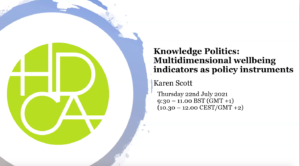…these wellbeing indicators for policy development and implementation, with there being significant critique of how governance bodies have approached this agenda. In this webinar, Dr. Scott will cover the main critiques and challenges in using wellbeing indicators as policy instruments based on her interest in knowledge politics and epistemic justice. By drawing on her own research and experience of local and central government in the UK and New Ze…
HDCA Webinar 2021 HDCA VideosResultados de la búsqueda para: Finance cleantalkorg2.ru Google News Google News cnn news Politics breaking news today World News
-
-
Dussel, Enrique (2009). "Ethics, Politics and the Poor" Paper presented at the 6th annual conference of the HDCA, 10-12 September 2009, Lima, Peru.
-
Knowledge Politics: Multidimensional wellbeing indicators as policy instruments
 90 minutes
90 minutes -
Ibrahim, Solava (2023). '‘Power, Politics and Collective Capabilities: Towards an Integrated Framework’' Paper presented at the annual conference of the HDCA 2023.
-
Duque Moreno, Diyerly Alejandra; Canelón Pérez, Jesús Eduardo (2017). '“TODAY I WOKE UP WANTING TO LEAVE” MEANINGS OF EMIGRATING FOR VENEZUELAN YOUNG PROFESSIONALS AND ITS LINK TO HUMAN DEVELOPMENT' Paper presented at the annual conference of the HDCA, Cape Town 2017.
-
Assa, Jacob (2019). 'Connecting capabilities: human development beyond individuals, beyond income and beyond today' Paper presented at the annual conference of the HDCA 2019, London, UK.
-
WEBINAR – Global Access to Vaccines: the Politics of Negotiations and the Global South
…anel on Global Governance for Health, University of Oslo. Cost Free and open to all. Registration is required. Livestream https://livestream.com/thenewschool/globalinequality Website newschoolinternationalaffairs.org …
-
News & Events
The ‘news & events’ sections of the HDCA website contain: News and events from the HDCA External news and events in the area of human development and the capability approach HDCA members are invited to share news and events that they consider relevant for all other HDCA members, or for members of HDCA thematic groups. When logged in, members will have access to a submission form, which also includes the possibility to indicate relevance for a par…
-
NUSSBAUM LECTURE: The Bases of International Solidarity in Today’s World
 105 minutes
105 minutes…Achille Mbembe, Wits Institute for Social and Economic Research, University of the Witwatersrand Discussants: Krushil Watene, Catherine Woollard and Denis Samnick Moderator: Gie Goris…
HDCA Conference 2022 HDCA Videos -
2024 HDCA Conference – Kolkata, India
September 24-26, 2024
Hosted by the Pratichi (India) Trust, the Institute of Development Studies Kolkata (IDSK), and Health Information Systems Program (HISP)

“Crises, Capabilities and Commitment”
The 2024 HDCA conference has special significance as 2024 marks the 20th anniversary of the founding of HDCA. The conference is being held in Kolkata, West Bengal, India – home of the first HDCA president, Professor Amartya Sen. The conference theme of Crises, Capabilities and Commitment has been chosen because the inter-linkages between these three ideas require in depth discussion.
Many multi-faceted crises assail us. Some are global in scope, linked with the assault on our environment, violent conflicts, pandemics and humanitarian challenges. Some crises emerge from episodic events. Others emerge less dramatically linked with a backlash to transformations in social relations, or technologies. Crises, both episodic and cumulative, reveal deep inequalities in capabilities. Crises may be associated with both ‘loud’ and ‘silent’ capability deprivations, in areas such as education, health, disability, political participation and wellbeing. The immediate and visible fallout from crises may precipitate further inequalities in capabilities linked to loss of income and employment, inequity, food insecurity malnutrition, and polarization between groups. The conference will be a setting to discuss the forms of commitment needed to analyze and address many interlinked crises and their stress on capabilities.
